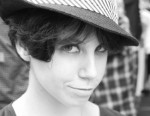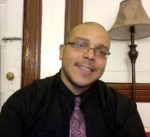Title
Work by three of this year’s playwriting fellows is represented in the seventh fall Playwrights Festival (September 3-6). The annual festival, which isn’t open to the public, gives the writers a chance to hear and see their works performed by fourth-year drama students. Here are excerpts from the trio: Max Posner’s Judy, which will be directed by Ken Rus Schmoll; Jen Silverman’s Wild Blue, whose director is yet to be announced; and Aurin Squire’s Obama-ology, which will be directed by Pirronne Yousefzadeh.
Body
Judy
Max Posner’s Judy is a portrait of one family’s struggle to reckon with the past when technology fails and human connection is just out of reach. It takes place in the winter of 2040. Three grown siblings—Timothy, Tara, and Kris—are spending lots of time in their basements. Timothy’s daughter, Eloise, is rapidly entering adolescence and talking to her Aunt Tara.
Tara: The first time I met your mom she and your father were three hours late. We were supposed to watch a play.
Eloise: Why were they late?
Tara: They lied about writing down the wrong directions—
Eloise: Directions?
Tara: In those days you did all the driving and searching and steering yourself.
Eloise: Wasn’t that dangerous?
Tara: A lot of people died, yes.
Eloise: What’s a play?
Tara: They were these events we all went to around Christmas time. People recited words to each other in the same order, in the same outfits, night after night. And the speakers in the outfits practiced and arrived early and became nervous. And we would pay a lot of money to go sit. And they’d build fake rooms, and the furniture in the fake rooms would face the listeners. And the listeners would laugh or sleep or say “mmm” without realizing it. So Timothy and Judy told some lie about getting bad directions from a homeless man selling the paper. But when they arrived at intermission, your mom and dad. They smelt like kissing. Like veeery recent kissing.
Eloise: Should we try Dad again?
Tara: Your dad likes to know that people are thinking of him and being late is one of the best ways to guarantee that people are thinking of you (from the moment you’re supposed to be somewhere until the second you arrive they are thinking of you).
Eloise: So when you want someone to think of you—
Tara: Arrive late.
Wild Blue
Prophetic blackbirds chatter on a wire, watching two parallel stories intertwine in Jen Silverman’s Wild Blue. In one world, Clem looks on worriedly as her mother, Cally, takes in a mysterious drifter. Elsewhere, a naive young king falls in love with Wild, a peasant girl who harbors a dangerous secret. Storm clouds threaten, but there are worse perils in store for those who possess an unguarded heart.
Wild: What are we doing?
Blue: Confessing. Everything we’ve ever done that was shameful or ecstatic or awful.
Ready?
Wild: This is a terrible idea.
Blue: Go! (deep breath: rapidfire) I lost my virginity when I was 23. My little brother lost his at 15; when I think about the extra eight years of experience he has, I feel insecure and awkward. Sometimes when I get up in the morning I just stand naked in front of the mirror and I feel so ugly. So absurd and ugly. I hate myself, a little bit all the time, and then a lot sometimes. I love beautiful things, I do stupid things for beautiful people, I let myself be taken advantage of, it’s a weakness and I know I’m doing it but I can’t seem to stop in time. Um. I always under-tip, when I eat out, I tell myself I’m just bad at math but actually I don’t even believe in tipping, why am I paying you to do the job you’re getting paid to do? Um. I’m scared of centipedes, I don’t like confrontation, I secretly wanted to be gay when I was younger because gay men seemed so confident. But then this one time in college my best friend asked if I wanted to give him a handjob, and I touched his penis, I held it in my hand, and then I just thought: how ungainly. How ugly men are. It always comes back to beauty, for me. (beat)
Your turn.
Obama-ology
In this play by Aurin Squire, when college graduate Warren takes a job with the 2008 Obama campaign, he’s fired up and ready to go—until he lands in the troubled streets of East Cleveland. He struggles to stick to his training script in a neighborhood where real change seems impossible. But somewhere between knocking on doors, fending off cops, and questioning his own racial identity, he finds himself enmeshed in the community in ways he never imagined.
Warren: My parents didn’t raise me to pretend like I’m from the ’hood.’ I hate it when educated Blacks fake an accent and start swinging their voice in a sing-songy cadence, quoting Negro spirituals like they’re from the fields.
Barbara: House slave vs. field slave. Blacks have been fighting the same battle with each other for hundreds of years.
Warren: Don’t give me that Malcolm X bullshit. I just got a ticket for taking a nap in a parked car. I am aware that I’m Black.
Barbara: This isn’t about just being aware of your Blackness. It’s about the shades of color in our own community. Do you embrace all of the differences or just think your way is the best? Because the field is also a part of you. Not just one side. And if we’re going to work together we have to embrace as many different shades of us as possible. Dark skinned, light skinned, biracial, high-yellow, redbone, college educated, GED, dropped out of school, nappy, kinky, braided, field, house, hood, suburbs, classroom, White House. It’s not Ebonics. It’s Obama-ology. That’s how you relate to people. You don’t have to beat people over the head with your education nor do you have to hide it. You use it to bring all the different parts together.







